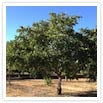WGMB
 Walnut Genome and Molecular Breeding Project: Application of Marker Breeding in the Walnut Improvement Program
Walnut Genome and Molecular Breeding Project: Application of Marker Breeding in the Walnut Improvement Program
The Walnut Improvement Program works to develop and release new walnut cultivars for the California walnut industry, combining early harvest date and high yield with good kernel color and in-shell traits. The identification of genes underlying these traits of interest will allow the application of Marker-Assisted Selection (MAS) and Genomic Selection (GS) technologies in walnut, increasing its breeding efficiency. The main objective of this project is to develop a comprehensive collection of genotypic and phenotypic data that will be useful for future genetic improvement in walnut. In this regard, 27 founders of the UCD Junglans regia breeding program have been whole-genome sequenced and over 600K Single Nucleotide Polymorphisms (SNPs) have been identified and selected for the construction of the first Walnut Affymetrix SNP Array. Thirty-eight F1-progeny and over sixty commercial cultivars of walnut have been genotyped with the novel 600K SNP array. These genotypic data will be used to understand the genetic basis of important agronomical traits in walnut, such as kernel color, seal strength, yield, harvest date and water efficiency. In the meantime, the assembly and annotation of the reference genome sequence of walnut (J. regia, cultivar ‘Chandler’) will be improved thanks to the application of advanced sequencing technologies.
Resources
- Dendrome
- Walnut Genomics Implementation Group (Coming soon)
Members
Funding for the Walnut Genome and Molecular Breeding Project is provided by the California Walnut Board
Participating Organizations



![]()
